Promotion of Democracy and Governance in Africa: A Critical Analysis
VerifiedAdded on 2021/01/02
|13
|4531
|454
Essay
AI Summary
This essay critically examines the promotion of democracy and good governance in Africa, arguing that they are not a panacea for the continent's developmental challenges and marginalization in the international system. The essay begins by providing an overview of the African scenario, including its political landscape and historical context, and then delves into the developmental challenges faced by African nations. It analyzes the relationship between democracy, good governance, and these challenges, highlighting the limitations of these systems in addressing issues such as poverty, corruption, and inequality. The essay further explores the impact of Africa's marginalization in the international system, considering the economic, political, and social factors contributing to this situation. Through a combination of historical analysis, case studies, and critical evaluation, the essay concludes that while democracy and good governance are important, they are insufficient on their own to overcome the complex challenges facing Africa, emphasizing the need for a more holistic approach that considers various sectors such as tourism, agriculture, and industry to achieve sustainable development. The document is contributed by a student to be published on the website Desklib. Desklib is a platform which provides all the necessary AI based study tools for students.
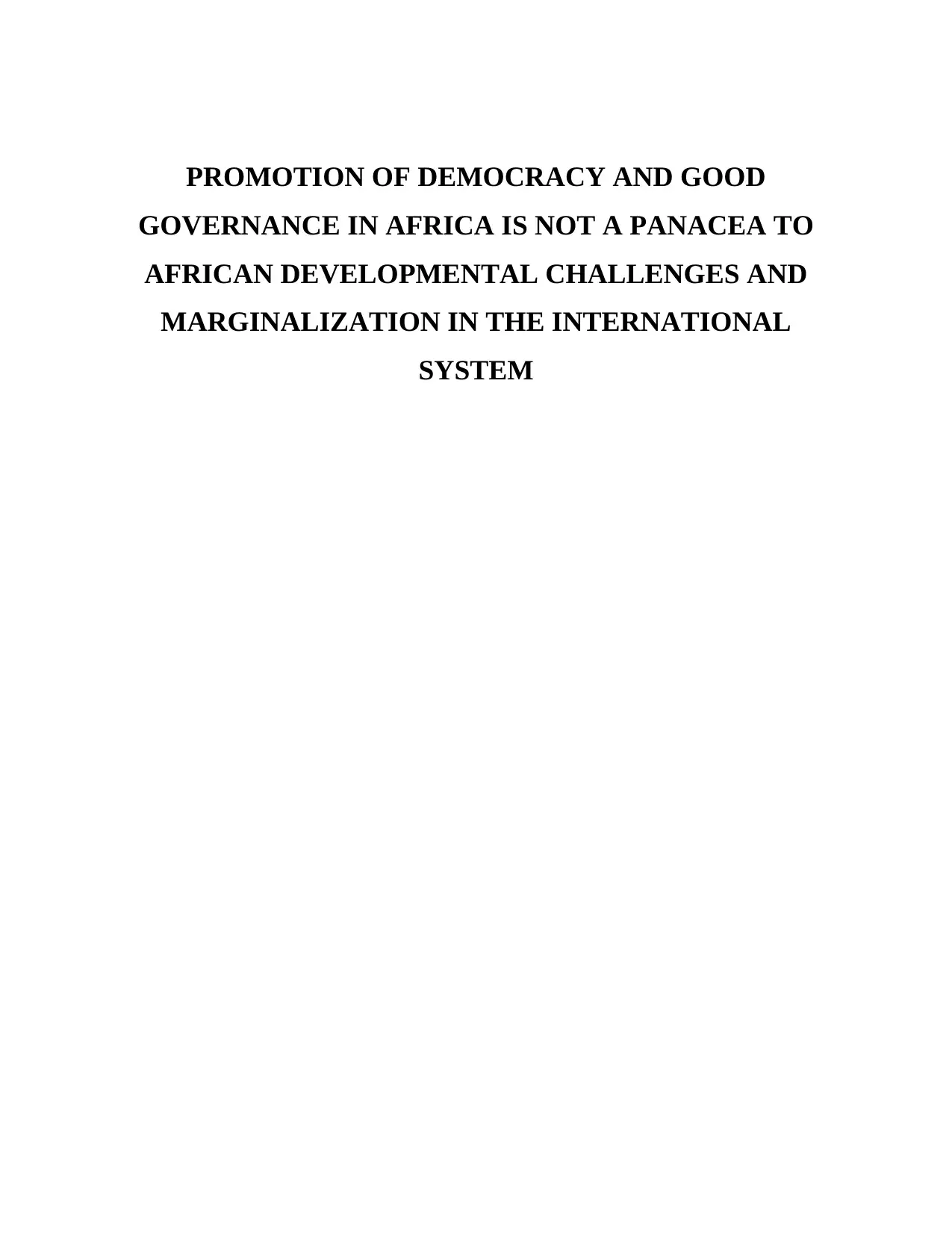
PROMOTION OF DEMOCRACY AND GOOD
GOVERNANCE IN AFRICA IS NOT A PANACEA TO
AFRICAN DEVELOPMENTAL CHALLENGES AND
MARGINALIZATION IN THE INTERNATIONAL
SYSTEM
GOVERNANCE IN AFRICA IS NOT A PANACEA TO
AFRICAN DEVELOPMENTAL CHALLENGES AND
MARGINALIZATION IN THE INTERNATIONAL
SYSTEM
Paraphrase This Document
Need a fresh take? Get an instant paraphrase of this document with our AI Paraphraser
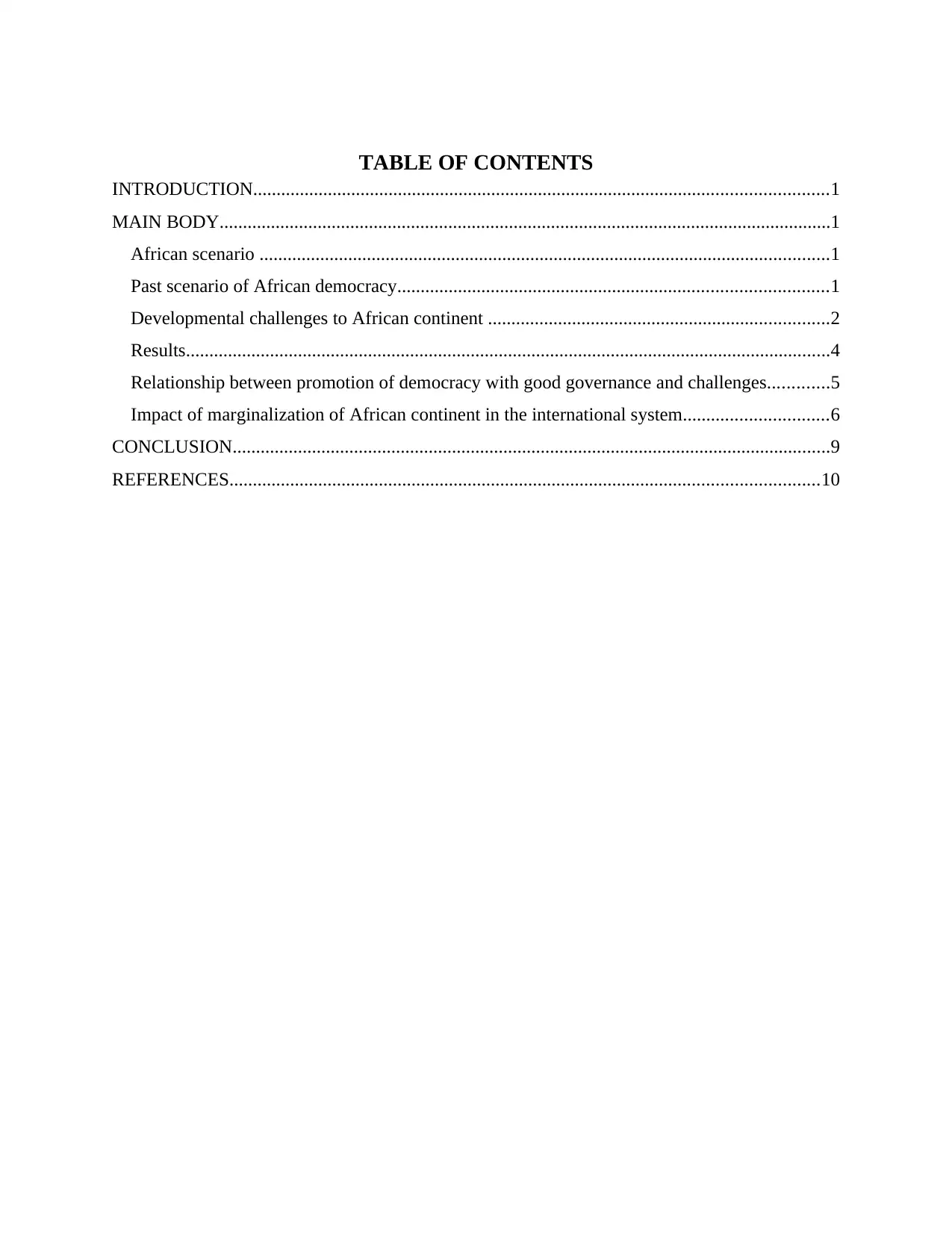
TABLE OF CONTENTS
INTRODUCTION...........................................................................................................................1
MAIN BODY...................................................................................................................................1
African scenario ..........................................................................................................................1
Past scenario of African democracy............................................................................................1
Developmental challenges to African continent .........................................................................2
Results..........................................................................................................................................4
Relationship between promotion of democracy with good governance and challenges.............5
Impact of marginalization of African continent in the international system...............................6
CONCLUSION................................................................................................................................9
REFERENCES..............................................................................................................................10
INTRODUCTION...........................................................................................................................1
MAIN BODY...................................................................................................................................1
African scenario ..........................................................................................................................1
Past scenario of African democracy............................................................................................1
Developmental challenges to African continent .........................................................................2
Results..........................................................................................................................................4
Relationship between promotion of democracy with good governance and challenges.............5
Impact of marginalization of African continent in the international system...............................6
CONCLUSION................................................................................................................................9
REFERENCES..............................................................................................................................10
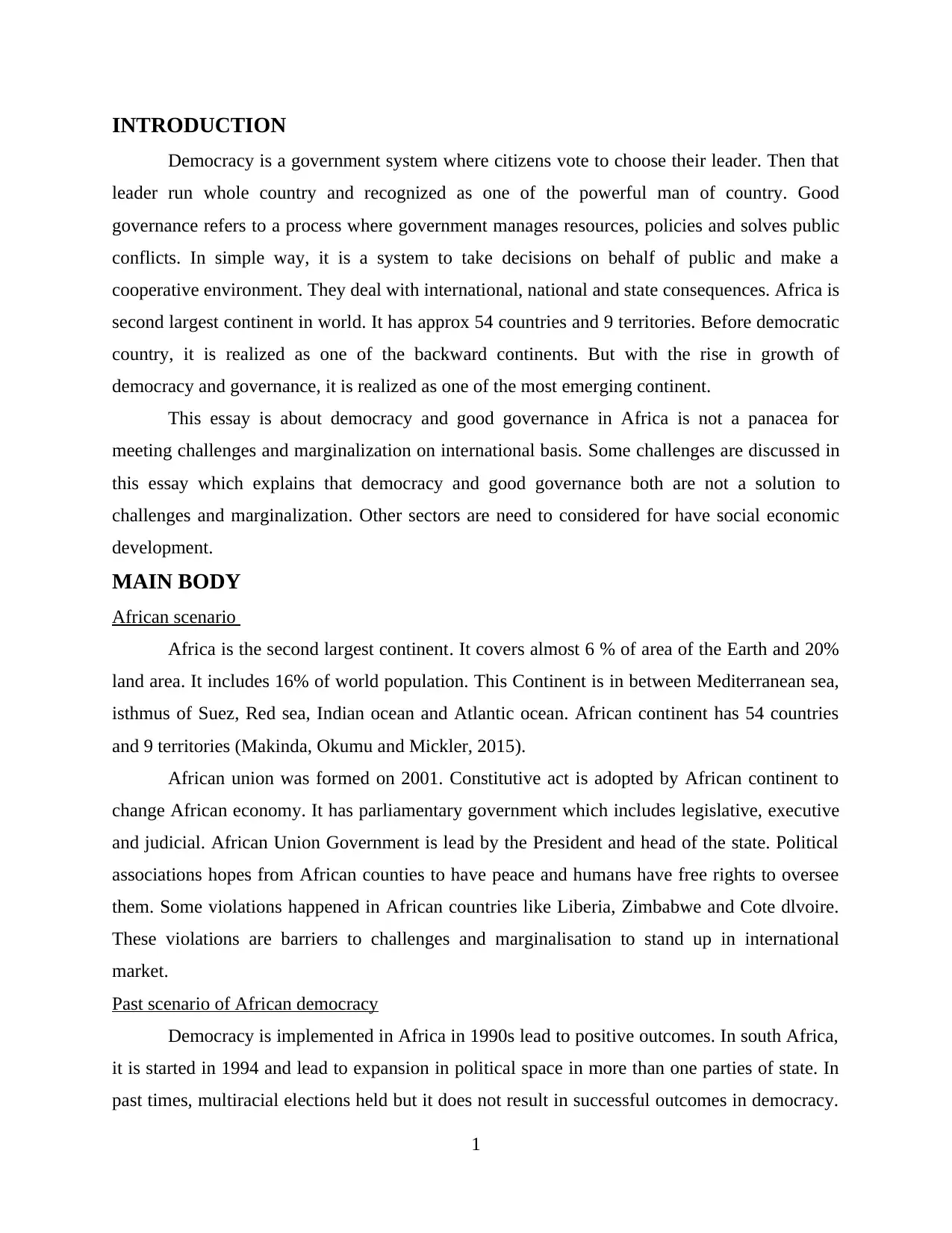
INTRODUCTION
Democracy is a government system where citizens vote to choose their leader. Then that
leader run whole country and recognized as one of the powerful man of country. Good
governance refers to a process where government manages resources, policies and solves public
conflicts. In simple way, it is a system to take decisions on behalf of public and make a
cooperative environment. They deal with international, national and state consequences. Africa is
second largest continent in world. It has approx 54 countries and 9 territories. Before democratic
country, it is realized as one of the backward continents. But with the rise in growth of
democracy and governance, it is realized as one of the most emerging continent.
This essay is about democracy and good governance in Africa is not a panacea for
meeting challenges and marginalization on international basis. Some challenges are discussed in
this essay which explains that democracy and good governance both are not a solution to
challenges and marginalization. Other sectors are need to considered for have social economic
development.
MAIN BODY
African scenario
Africa is the second largest continent. It covers almost 6 % of area of the Earth and 20%
land area. It includes 16% of world population. This Continent is in between Mediterranean sea,
isthmus of Suez, Red sea, Indian ocean and Atlantic ocean. African continent has 54 countries
and 9 territories (Makinda, Okumu and Mickler, 2015).
African union was formed on 2001. Constitutive act is adopted by African continent to
change African economy. It has parliamentary government which includes legislative, executive
and judicial. African Union Government is lead by the President and head of the state. Political
associations hopes from African counties to have peace and humans have free rights to oversee
them. Some violations happened in African countries like Liberia, Zimbabwe and Cote dlvoire.
These violations are barriers to challenges and marginalisation to stand up in international
market.
Past scenario of African democracy
Democracy is implemented in Africa in 1990s lead to positive outcomes. In south Africa,
it is started in 1994 and lead to expansion in political space in more than one parties of state. In
past times, multiracial elections held but it does not result in successful outcomes in democracy.
1
Democracy is a government system where citizens vote to choose their leader. Then that
leader run whole country and recognized as one of the powerful man of country. Good
governance refers to a process where government manages resources, policies and solves public
conflicts. In simple way, it is a system to take decisions on behalf of public and make a
cooperative environment. They deal with international, national and state consequences. Africa is
second largest continent in world. It has approx 54 countries and 9 territories. Before democratic
country, it is realized as one of the backward continents. But with the rise in growth of
democracy and governance, it is realized as one of the most emerging continent.
This essay is about democracy and good governance in Africa is not a panacea for
meeting challenges and marginalization on international basis. Some challenges are discussed in
this essay which explains that democracy and good governance both are not a solution to
challenges and marginalization. Other sectors are need to considered for have social economic
development.
MAIN BODY
African scenario
Africa is the second largest continent. It covers almost 6 % of area of the Earth and 20%
land area. It includes 16% of world population. This Continent is in between Mediterranean sea,
isthmus of Suez, Red sea, Indian ocean and Atlantic ocean. African continent has 54 countries
and 9 territories (Makinda, Okumu and Mickler, 2015).
African union was formed on 2001. Constitutive act is adopted by African continent to
change African economy. It has parliamentary government which includes legislative, executive
and judicial. African Union Government is lead by the President and head of the state. Political
associations hopes from African counties to have peace and humans have free rights to oversee
them. Some violations happened in African countries like Liberia, Zimbabwe and Cote dlvoire.
These violations are barriers to challenges and marginalisation to stand up in international
market.
Past scenario of African democracy
Democracy is implemented in Africa in 1990s lead to positive outcomes. In south Africa,
it is started in 1994 and lead to expansion in political space in more than one parties of state. In
past times, multiracial elections held but it does not result in successful outcomes in democracy.
1
⊘ This is a preview!⊘
Do you want full access?
Subscribe today to unlock all pages.

Trusted by 1+ million students worldwide
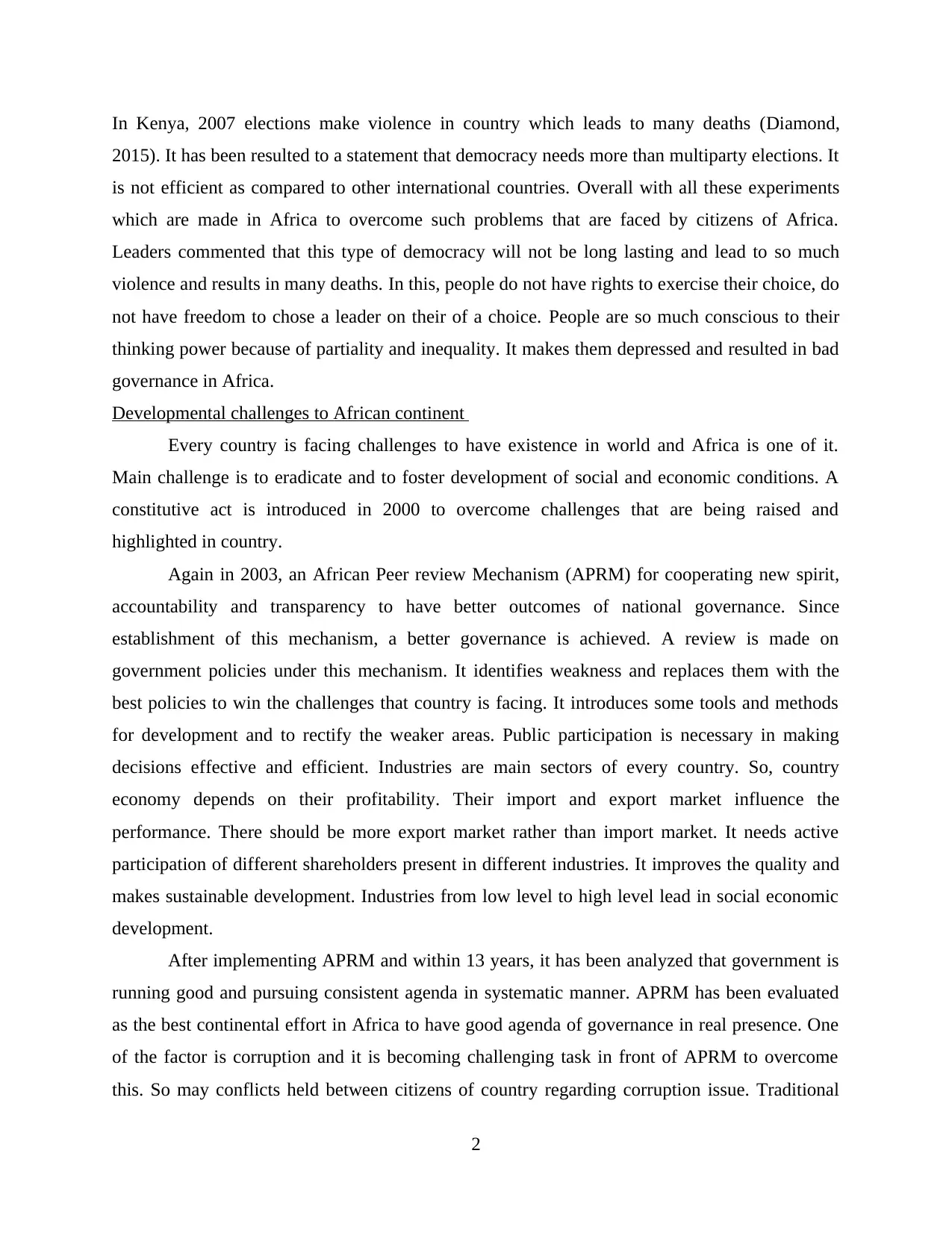
In Kenya, 2007 elections make violence in country which leads to many deaths (Diamond,
2015). It has been resulted to a statement that democracy needs more than multiparty elections. It
is not efficient as compared to other international countries. Overall with all these experiments
which are made in Africa to overcome such problems that are faced by citizens of Africa.
Leaders commented that this type of democracy will not be long lasting and lead to so much
violence and results in many deaths. In this, people do not have rights to exercise their choice, do
not have freedom to chose a leader on their of a choice. People are so much conscious to their
thinking power because of partiality and inequality. It makes them depressed and resulted in bad
governance in Africa.
Developmental challenges to African continent
Every country is facing challenges to have existence in world and Africa is one of it.
Main challenge is to eradicate and to foster development of social and economic conditions. A
constitutive act is introduced in 2000 to overcome challenges that are being raised and
highlighted in country.
Again in 2003, an African Peer review Mechanism (APRM) for cooperating new spirit,
accountability and transparency to have better outcomes of national governance. Since
establishment of this mechanism, a better governance is achieved. A review is made on
government policies under this mechanism. It identifies weakness and replaces them with the
best policies to win the challenges that country is facing. It introduces some tools and methods
for development and to rectify the weaker areas. Public participation is necessary in making
decisions effective and efficient. Industries are main sectors of every country. So, country
economy depends on their profitability. Their import and export market influence the
performance. There should be more export market rather than import market. It needs active
participation of different shareholders present in different industries. It improves the quality and
makes sustainable development. Industries from low level to high level lead in social economic
development.
After implementing APRM and within 13 years, it has been analyzed that government is
running good and pursuing consistent agenda in systematic manner. APRM has been evaluated
as the best continental effort in Africa to have good agenda of governance in real presence. One
of the factor is corruption and it is becoming challenging task in front of APRM to overcome
this. So may conflicts held between citizens of country regarding corruption issue. Traditional
2
2015). It has been resulted to a statement that democracy needs more than multiparty elections. It
is not efficient as compared to other international countries. Overall with all these experiments
which are made in Africa to overcome such problems that are faced by citizens of Africa.
Leaders commented that this type of democracy will not be long lasting and lead to so much
violence and results in many deaths. In this, people do not have rights to exercise their choice, do
not have freedom to chose a leader on their of a choice. People are so much conscious to their
thinking power because of partiality and inequality. It makes them depressed and resulted in bad
governance in Africa.
Developmental challenges to African continent
Every country is facing challenges to have existence in world and Africa is one of it.
Main challenge is to eradicate and to foster development of social and economic conditions. A
constitutive act is introduced in 2000 to overcome challenges that are being raised and
highlighted in country.
Again in 2003, an African Peer review Mechanism (APRM) for cooperating new spirit,
accountability and transparency to have better outcomes of national governance. Since
establishment of this mechanism, a better governance is achieved. A review is made on
government policies under this mechanism. It identifies weakness and replaces them with the
best policies to win the challenges that country is facing. It introduces some tools and methods
for development and to rectify the weaker areas. Public participation is necessary in making
decisions effective and efficient. Industries are main sectors of every country. So, country
economy depends on their profitability. Their import and export market influence the
performance. There should be more export market rather than import market. It needs active
participation of different shareholders present in different industries. It improves the quality and
makes sustainable development. Industries from low level to high level lead in social economic
development.
After implementing APRM and within 13 years, it has been analyzed that government is
running good and pursuing consistent agenda in systematic manner. APRM has been evaluated
as the best continental effort in Africa to have good agenda of governance in real presence. One
of the factor is corruption and it is becoming challenging task in front of APRM to overcome
this. So may conflicts held between citizens of country regarding corruption issue. Traditional
2
Paraphrase This Document
Need a fresh take? Get an instant paraphrase of this document with our AI Paraphraser
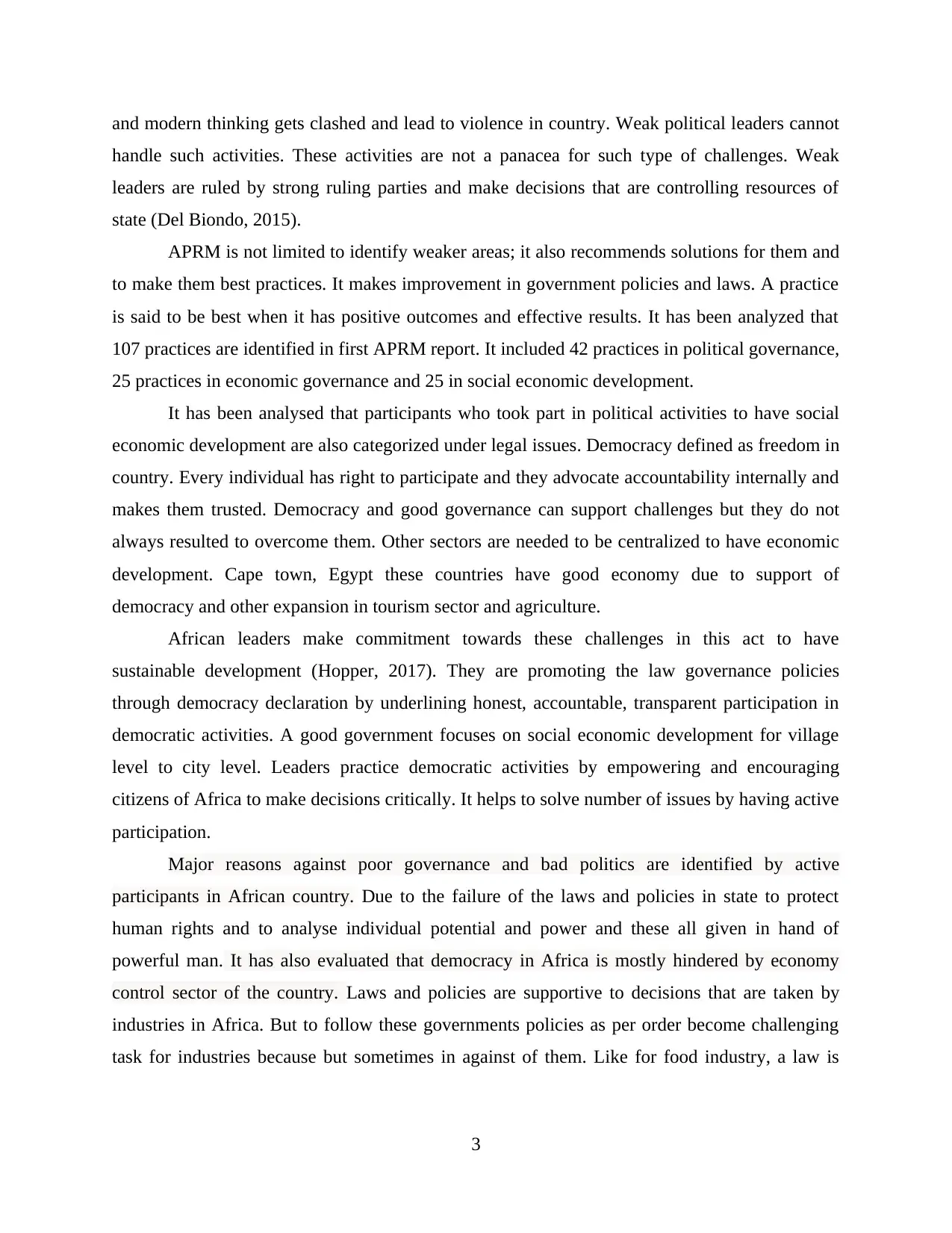
and modern thinking gets clashed and lead to violence in country. Weak political leaders cannot
handle such activities. These activities are not a panacea for such type of challenges. Weak
leaders are ruled by strong ruling parties and make decisions that are controlling resources of
state (Del Biondo, 2015).
APRM is not limited to identify weaker areas; it also recommends solutions for them and
to make them best practices. It makes improvement in government policies and laws. A practice
is said to be best when it has positive outcomes and effective results. It has been analyzed that
107 practices are identified in first APRM report. It included 42 practices in political governance,
25 practices in economic governance and 25 in social economic development.
It has been analysed that participants who took part in political activities to have social
economic development are also categorized under legal issues. Democracy defined as freedom in
country. Every individual has right to participate and they advocate accountability internally and
makes them trusted. Democracy and good governance can support challenges but they do not
always resulted to overcome them. Other sectors are needed to be centralized to have economic
development. Cape town, Egypt these countries have good economy due to support of
democracy and other expansion in tourism sector and agriculture.
African leaders make commitment towards these challenges in this act to have
sustainable development (Hopper, 2017). They are promoting the law governance policies
through democracy declaration by underlining honest, accountable, transparent participation in
democratic activities. A good government focuses on social economic development for village
level to city level. Leaders practice democratic activities by empowering and encouraging
citizens of Africa to make decisions critically. It helps to solve number of issues by having active
participation.
Major reasons against poor governance and bad politics are identified by active
participants in African country. Due to the failure of the laws and policies in state to protect
human rights and to analyse individual potential and power and these all given in hand of
powerful man. It has also evaluated that democracy in Africa is mostly hindered by economy
control sector of the country. Laws and policies are supportive to decisions that are taken by
industries in Africa. But to follow these governments policies as per order become challenging
task for industries because but sometimes in against of them. Like for food industry, a law is
3
handle such activities. These activities are not a panacea for such type of challenges. Weak
leaders are ruled by strong ruling parties and make decisions that are controlling resources of
state (Del Biondo, 2015).
APRM is not limited to identify weaker areas; it also recommends solutions for them and
to make them best practices. It makes improvement in government policies and laws. A practice
is said to be best when it has positive outcomes and effective results. It has been analyzed that
107 practices are identified in first APRM report. It included 42 practices in political governance,
25 practices in economic governance and 25 in social economic development.
It has been analysed that participants who took part in political activities to have social
economic development are also categorized under legal issues. Democracy defined as freedom in
country. Every individual has right to participate and they advocate accountability internally and
makes them trusted. Democracy and good governance can support challenges but they do not
always resulted to overcome them. Other sectors are needed to be centralized to have economic
development. Cape town, Egypt these countries have good economy due to support of
democracy and other expansion in tourism sector and agriculture.
African leaders make commitment towards these challenges in this act to have
sustainable development (Hopper, 2017). They are promoting the law governance policies
through democracy declaration by underlining honest, accountable, transparent participation in
democratic activities. A good government focuses on social economic development for village
level to city level. Leaders practice democratic activities by empowering and encouraging
citizens of Africa to make decisions critically. It helps to solve number of issues by having active
participation.
Major reasons against poor governance and bad politics are identified by active
participants in African country. Due to the failure of the laws and policies in state to protect
human rights and to analyse individual potential and power and these all given in hand of
powerful man. It has also evaluated that democracy in Africa is mostly hindered by economy
control sector of the country. Laws and policies are supportive to decisions that are taken by
industries in Africa. But to follow these governments policies as per order become challenging
task for industries because but sometimes in against of them. Like for food industry, a law is
3
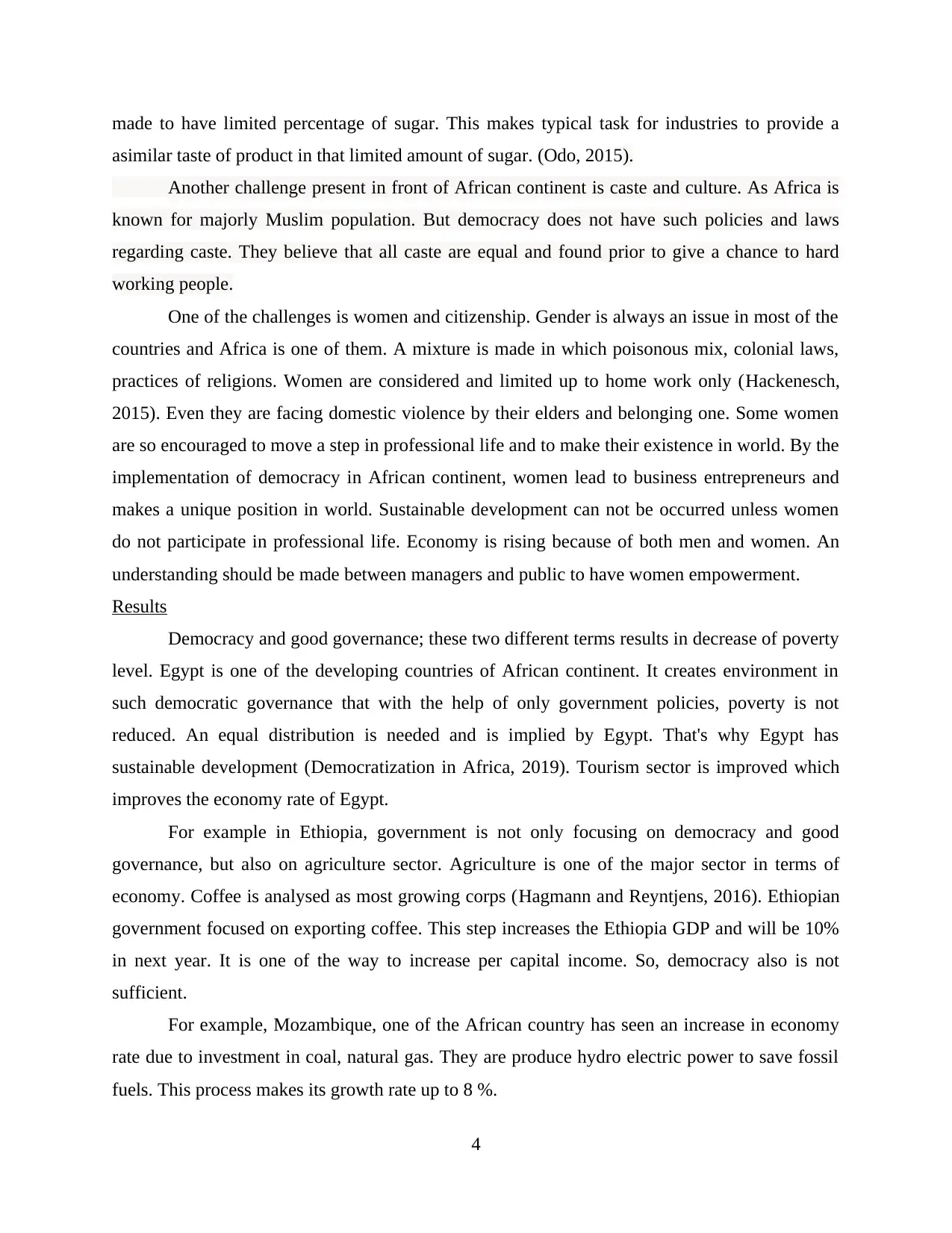
made to have limited percentage of sugar. This makes typical task for industries to provide a
asimilar taste of product in that limited amount of sugar. (Odo, 2015).
Another challenge present in front of African continent is caste and culture. As Africa is
known for majorly Muslim population. But democracy does not have such policies and laws
regarding caste. They believe that all caste are equal and found prior to give a chance to hard
working people.
One of the challenges is women and citizenship. Gender is always an issue in most of the
countries and Africa is one of them. A mixture is made in which poisonous mix, colonial laws,
practices of religions. Women are considered and limited up to home work only (Hackenesch,
2015). Even they are facing domestic violence by their elders and belonging one. Some women
are so encouraged to move a step in professional life and to make their existence in world. By the
implementation of democracy in African continent, women lead to business entrepreneurs and
makes a unique position in world. Sustainable development can not be occurred unless women
do not participate in professional life. Economy is rising because of both men and women. An
understanding should be made between managers and public to have women empowerment.
Results
Democracy and good governance; these two different terms results in decrease of poverty
level. Egypt is one of the developing countries of African continent. It creates environment in
such democratic governance that with the help of only government policies, poverty is not
reduced. An equal distribution is needed and is implied by Egypt. That's why Egypt has
sustainable development (Democratization in Africa, 2019). Tourism sector is improved which
improves the economy rate of Egypt.
For example in Ethiopia, government is not only focusing on democracy and good
governance, but also on agriculture sector. Agriculture is one of the major sector in terms of
economy. Coffee is analysed as most growing corps (Hagmann and Reyntjens, 2016). Ethiopian
government focused on exporting coffee. This step increases the Ethiopia GDP and will be 10%
in next year. It is one of the way to increase per capital income. So, democracy also is not
sufficient.
For example, Mozambique, one of the African country has seen an increase in economy
rate due to investment in coal, natural gas. They are produce hydro electric power to save fossil
fuels. This process makes its growth rate up to 8 %.
4
asimilar taste of product in that limited amount of sugar. (Odo, 2015).
Another challenge present in front of African continent is caste and culture. As Africa is
known for majorly Muslim population. But democracy does not have such policies and laws
regarding caste. They believe that all caste are equal and found prior to give a chance to hard
working people.
One of the challenges is women and citizenship. Gender is always an issue in most of the
countries and Africa is one of them. A mixture is made in which poisonous mix, colonial laws,
practices of religions. Women are considered and limited up to home work only (Hackenesch,
2015). Even they are facing domestic violence by their elders and belonging one. Some women
are so encouraged to move a step in professional life and to make their existence in world. By the
implementation of democracy in African continent, women lead to business entrepreneurs and
makes a unique position in world. Sustainable development can not be occurred unless women
do not participate in professional life. Economy is rising because of both men and women. An
understanding should be made between managers and public to have women empowerment.
Results
Democracy and good governance; these two different terms results in decrease of poverty
level. Egypt is one of the developing countries of African continent. It creates environment in
such democratic governance that with the help of only government policies, poverty is not
reduced. An equal distribution is needed and is implied by Egypt. That's why Egypt has
sustainable development (Democratization in Africa, 2019). Tourism sector is improved which
improves the economy rate of Egypt.
For example in Ethiopia, government is not only focusing on democracy and good
governance, but also on agriculture sector. Agriculture is one of the major sector in terms of
economy. Coffee is analysed as most growing corps (Hagmann and Reyntjens, 2016). Ethiopian
government focused on exporting coffee. This step increases the Ethiopia GDP and will be 10%
in next year. It is one of the way to increase per capital income. So, democracy also is not
sufficient.
For example, Mozambique, one of the African country has seen an increase in economy
rate due to investment in coal, natural gas. They are produce hydro electric power to save fossil
fuels. This process makes its growth rate up to 8 %.
4
⊘ This is a preview!⊘
Do you want full access?
Subscribe today to unlock all pages.

Trusted by 1+ million students worldwide
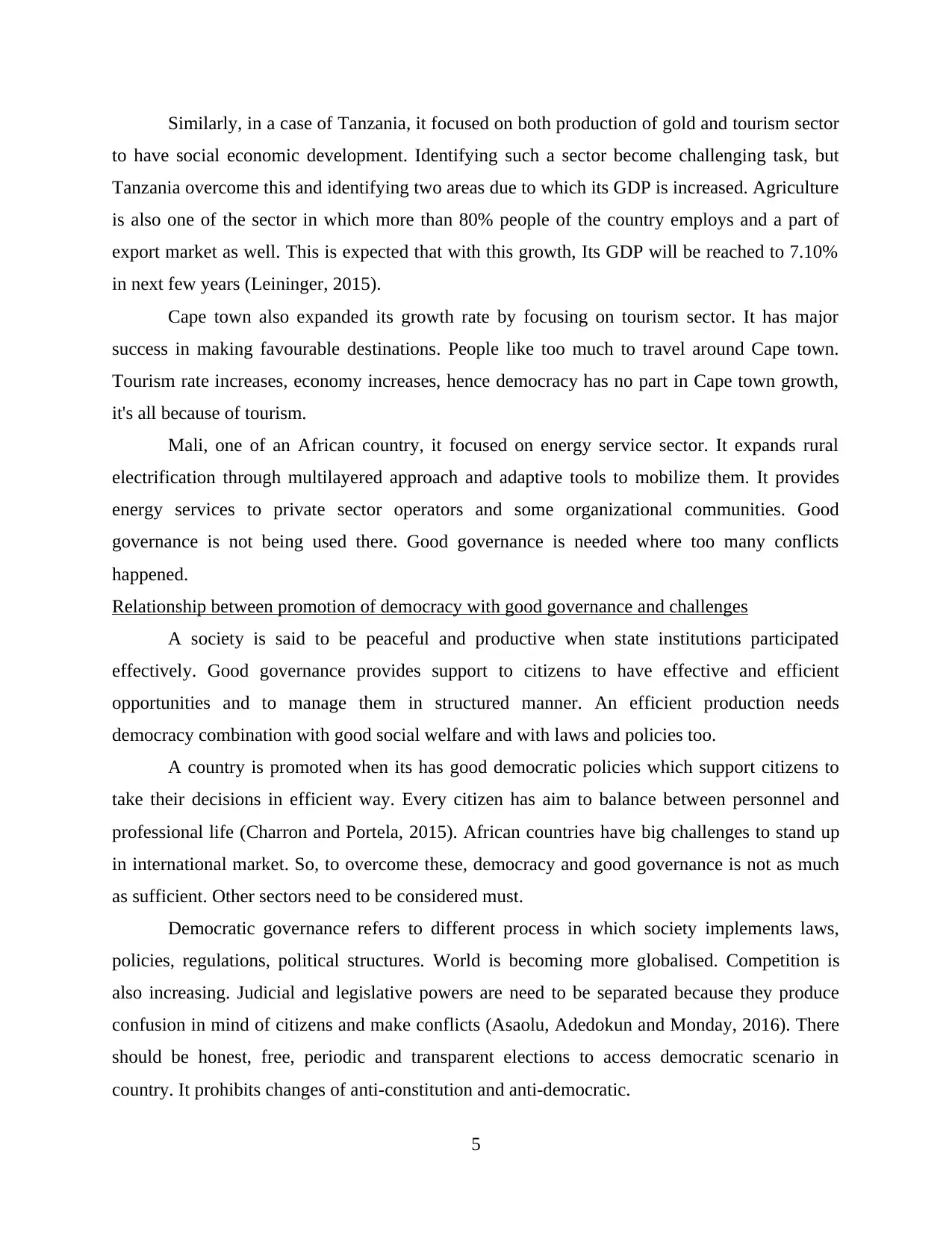
Similarly, in a case of Tanzania, it focused on both production of gold and tourism sector
to have social economic development. Identifying such a sector become challenging task, but
Tanzania overcome this and identifying two areas due to which its GDP is increased. Agriculture
is also one of the sector in which more than 80% people of the country employs and a part of
export market as well. This is expected that with this growth, Its GDP will be reached to 7.10%
in next few years (Leininger, 2015).
Cape town also expanded its growth rate by focusing on tourism sector. It has major
success in making favourable destinations. People like too much to travel around Cape town.
Tourism rate increases, economy increases, hence democracy has no part in Cape town growth,
it's all because of tourism.
Mali, one of an African country, it focused on energy service sector. It expands rural
electrification through multilayered approach and adaptive tools to mobilize them. It provides
energy services to private sector operators and some organizational communities. Good
governance is not being used there. Good governance is needed where too many conflicts
happened.
Relationship between promotion of democracy with good governance and challenges
A society is said to be peaceful and productive when state institutions participated
effectively. Good governance provides support to citizens to have effective and efficient
opportunities and to manage them in structured manner. An efficient production needs
democracy combination with good social welfare and with laws and policies too.
A country is promoted when its has good democratic policies which support citizens to
take their decisions in efficient way. Every citizen has aim to balance between personnel and
professional life (Charron and Portela, 2015). African countries have big challenges to stand up
in international market. So, to overcome these, democracy and good governance is not as much
as sufficient. Other sectors need to be considered must.
Democratic governance refers to different process in which society implements laws,
policies, regulations, political structures. World is becoming more globalised. Competition is
also increasing. Judicial and legislative powers are need to be separated because they produce
confusion in mind of citizens and make conflicts (Asaolu, Adedokun and Monday, 2016). There
should be honest, free, periodic and transparent elections to access democratic scenario in
country. It prohibits changes of anti-constitution and anti-democratic.
5
to have social economic development. Identifying such a sector become challenging task, but
Tanzania overcome this and identifying two areas due to which its GDP is increased. Agriculture
is also one of the sector in which more than 80% people of the country employs and a part of
export market as well. This is expected that with this growth, Its GDP will be reached to 7.10%
in next few years (Leininger, 2015).
Cape town also expanded its growth rate by focusing on tourism sector. It has major
success in making favourable destinations. People like too much to travel around Cape town.
Tourism rate increases, economy increases, hence democracy has no part in Cape town growth,
it's all because of tourism.
Mali, one of an African country, it focused on energy service sector. It expands rural
electrification through multilayered approach and adaptive tools to mobilize them. It provides
energy services to private sector operators and some organizational communities. Good
governance is not being used there. Good governance is needed where too many conflicts
happened.
Relationship between promotion of democracy with good governance and challenges
A society is said to be peaceful and productive when state institutions participated
effectively. Good governance provides support to citizens to have effective and efficient
opportunities and to manage them in structured manner. An efficient production needs
democracy combination with good social welfare and with laws and policies too.
A country is promoted when its has good democratic policies which support citizens to
take their decisions in efficient way. Every citizen has aim to balance between personnel and
professional life (Charron and Portela, 2015). African countries have big challenges to stand up
in international market. So, to overcome these, democracy and good governance is not as much
as sufficient. Other sectors need to be considered must.
Democratic governance refers to different process in which society implements laws,
policies, regulations, political structures. World is becoming more globalised. Competition is
also increasing. Judicial and legislative powers are need to be separated because they produce
confusion in mind of citizens and make conflicts (Asaolu, Adedokun and Monday, 2016). There
should be honest, free, periodic and transparent elections to access democratic scenario in
country. It prohibits changes of anti-constitution and anti-democratic.
5
Paraphrase This Document
Need a fresh take? Get an instant paraphrase of this document with our AI Paraphraser
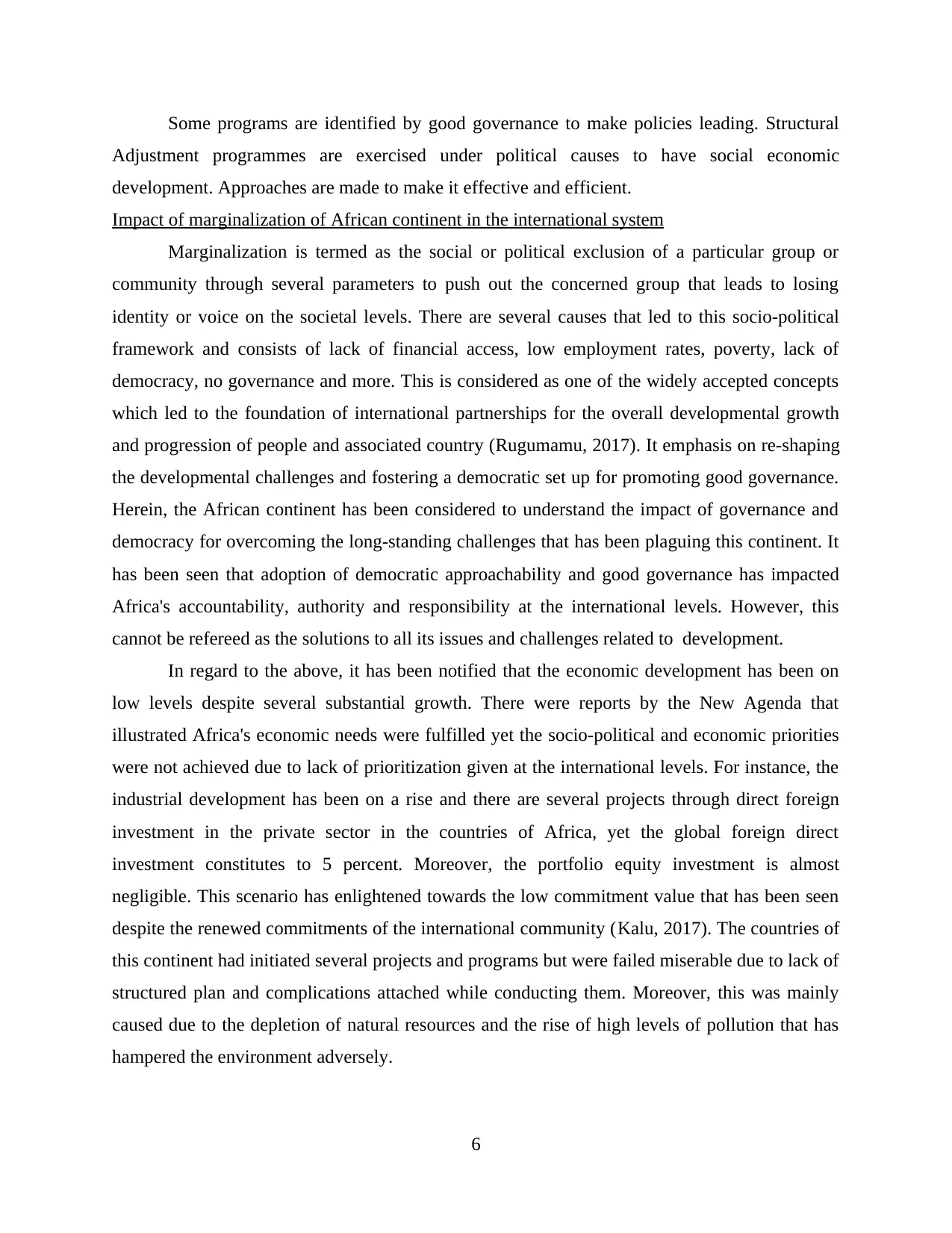
Some programs are identified by good governance to make policies leading. Structural
Adjustment programmes are exercised under political causes to have social economic
development. Approaches are made to make it effective and efficient.
Impact of marginalization of African continent in the international system
Marginalization is termed as the social or political exclusion of a particular group or
community through several parameters to push out the concerned group that leads to losing
identity or voice on the societal levels. There are several causes that led to this socio-political
framework and consists of lack of financial access, low employment rates, poverty, lack of
democracy, no governance and more. This is considered as one of the widely accepted concepts
which led to the foundation of international partnerships for the overall developmental growth
and progression of people and associated country (Rugumamu, 2017). It emphasis on re-shaping
the developmental challenges and fostering a democratic set up for promoting good governance.
Herein, the African continent has been considered to understand the impact of governance and
democracy for overcoming the long-standing challenges that has been plaguing this continent. It
has been seen that adoption of democratic approachability and good governance has impacted
Africa's accountability, authority and responsibility at the international levels. However, this
cannot be refereed as the solutions to all its issues and challenges related to development.
In regard to the above, it has been notified that the economic development has been on
low levels despite several substantial growth. There were reports by the New Agenda that
illustrated Africa's economic needs were fulfilled yet the socio-political and economic priorities
were not achieved due to lack of prioritization given at the international levels. For instance, the
industrial development has been on a rise and there are several projects through direct foreign
investment in the private sector in the countries of Africa, yet the global foreign direct
investment constitutes to 5 percent. Moreover, the portfolio equity investment is almost
negligible. This scenario has enlightened towards the low commitment value that has been seen
despite the renewed commitments of the international community (Kalu, 2017). The countries of
this continent had initiated several projects and programs but were failed miserable due to lack of
structured plan and complications attached while conducting them. Moreover, this was mainly
caused due to the depletion of natural resources and the rise of high levels of pollution that has
hampered the environment adversely.
6
Adjustment programmes are exercised under political causes to have social economic
development. Approaches are made to make it effective and efficient.
Impact of marginalization of African continent in the international system
Marginalization is termed as the social or political exclusion of a particular group or
community through several parameters to push out the concerned group that leads to losing
identity or voice on the societal levels. There are several causes that led to this socio-political
framework and consists of lack of financial access, low employment rates, poverty, lack of
democracy, no governance and more. This is considered as one of the widely accepted concepts
which led to the foundation of international partnerships for the overall developmental growth
and progression of people and associated country (Rugumamu, 2017). It emphasis on re-shaping
the developmental challenges and fostering a democratic set up for promoting good governance.
Herein, the African continent has been considered to understand the impact of governance and
democracy for overcoming the long-standing challenges that has been plaguing this continent. It
has been seen that adoption of democratic approachability and good governance has impacted
Africa's accountability, authority and responsibility at the international levels. However, this
cannot be refereed as the solutions to all its issues and challenges related to development.
In regard to the above, it has been notified that the economic development has been on
low levels despite several substantial growth. There were reports by the New Agenda that
illustrated Africa's economic needs were fulfilled yet the socio-political and economic priorities
were not achieved due to lack of prioritization given at the international levels. For instance, the
industrial development has been on a rise and there are several projects through direct foreign
investment in the private sector in the countries of Africa, yet the global foreign direct
investment constitutes to 5 percent. Moreover, the portfolio equity investment is almost
negligible. This scenario has enlightened towards the low commitment value that has been seen
despite the renewed commitments of the international community (Kalu, 2017). The countries of
this continent had initiated several projects and programs but were failed miserable due to lack of
structured plan and complications attached while conducting them. Moreover, this was mainly
caused due to the depletion of natural resources and the rise of high levels of pollution that has
hampered the environment adversely.
6
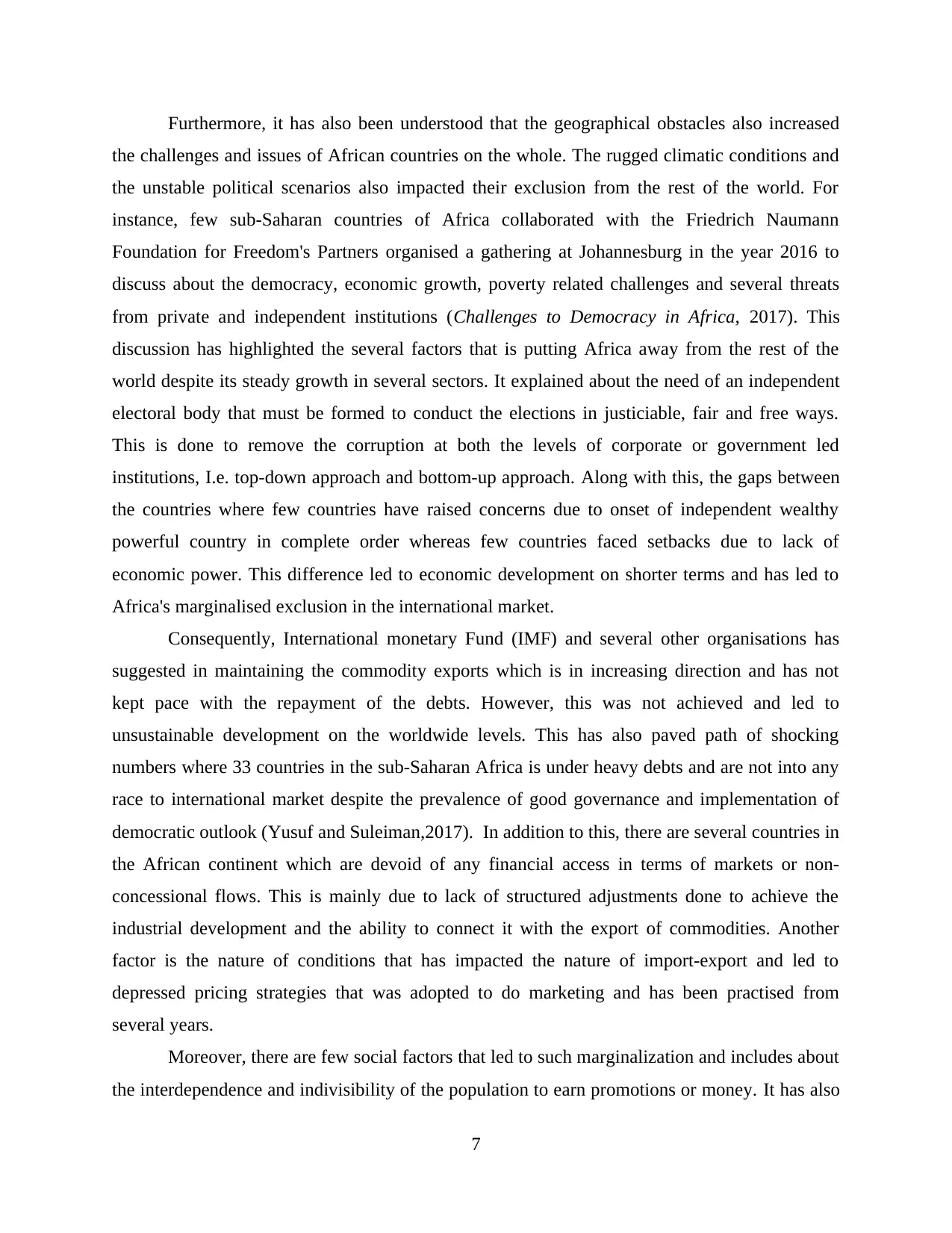
Furthermore, it has also been understood that the geographical obstacles also increased
the challenges and issues of African countries on the whole. The rugged climatic conditions and
the unstable political scenarios also impacted their exclusion from the rest of the world. For
instance, few sub-Saharan countries of Africa collaborated with the Friedrich Naumann
Foundation for Freedom's Partners organised a gathering at Johannesburg in the year 2016 to
discuss about the democracy, economic growth, poverty related challenges and several threats
from private and independent institutions (Challenges to Democracy in Africa, 2017). This
discussion has highlighted the several factors that is putting Africa away from the rest of the
world despite its steady growth in several sectors. It explained about the need of an independent
electoral body that must be formed to conduct the elections in justiciable, fair and free ways.
This is done to remove the corruption at both the levels of corporate or government led
institutions, I.e. top-down approach and bottom-up approach. Along with this, the gaps between
the countries where few countries have raised concerns due to onset of independent wealthy
powerful country in complete order whereas few countries faced setbacks due to lack of
economic power. This difference led to economic development on shorter terms and has led to
Africa's marginalised exclusion in the international market.
Consequently, International monetary Fund (IMF) and several other organisations has
suggested in maintaining the commodity exports which is in increasing direction and has not
kept pace with the repayment of the debts. However, this was not achieved and led to
unsustainable development on the worldwide levels. This has also paved path of shocking
numbers where 33 countries in the sub-Saharan Africa is under heavy debts and are not into any
race to international market despite the prevalence of good governance and implementation of
democratic outlook (Yusuf and Suleiman,2017). In addition to this, there are several countries in
the African continent which are devoid of any financial access in terms of markets or non-
concessional flows. This is mainly due to lack of structured adjustments done to achieve the
industrial development and the ability to connect it with the export of commodities. Another
factor is the nature of conditions that has impacted the nature of import-export and led to
depressed pricing strategies that was adopted to do marketing and has been practised from
several years.
Moreover, there are few social factors that led to such marginalization and includes about
the interdependence and indivisibility of the population to earn promotions or money. It has also
7
the challenges and issues of African countries on the whole. The rugged climatic conditions and
the unstable political scenarios also impacted their exclusion from the rest of the world. For
instance, few sub-Saharan countries of Africa collaborated with the Friedrich Naumann
Foundation for Freedom's Partners organised a gathering at Johannesburg in the year 2016 to
discuss about the democracy, economic growth, poverty related challenges and several threats
from private and independent institutions (Challenges to Democracy in Africa, 2017). This
discussion has highlighted the several factors that is putting Africa away from the rest of the
world despite its steady growth in several sectors. It explained about the need of an independent
electoral body that must be formed to conduct the elections in justiciable, fair and free ways.
This is done to remove the corruption at both the levels of corporate or government led
institutions, I.e. top-down approach and bottom-up approach. Along with this, the gaps between
the countries where few countries have raised concerns due to onset of independent wealthy
powerful country in complete order whereas few countries faced setbacks due to lack of
economic power. This difference led to economic development on shorter terms and has led to
Africa's marginalised exclusion in the international market.
Consequently, International monetary Fund (IMF) and several other organisations has
suggested in maintaining the commodity exports which is in increasing direction and has not
kept pace with the repayment of the debts. However, this was not achieved and led to
unsustainable development on the worldwide levels. This has also paved path of shocking
numbers where 33 countries in the sub-Saharan Africa is under heavy debts and are not into any
race to international market despite the prevalence of good governance and implementation of
democratic outlook (Yusuf and Suleiman,2017). In addition to this, there are several countries in
the African continent which are devoid of any financial access in terms of markets or non-
concessional flows. This is mainly due to lack of structured adjustments done to achieve the
industrial development and the ability to connect it with the export of commodities. Another
factor is the nature of conditions that has impacted the nature of import-export and led to
depressed pricing strategies that was adopted to do marketing and has been practised from
several years.
Moreover, there are few social factors that led to such marginalization and includes about
the interdependence and indivisibility of the population to earn promotions or money. It has also
7
⊘ This is a preview!⊘
Do you want full access?
Subscribe today to unlock all pages.

Trusted by 1+ million students worldwide
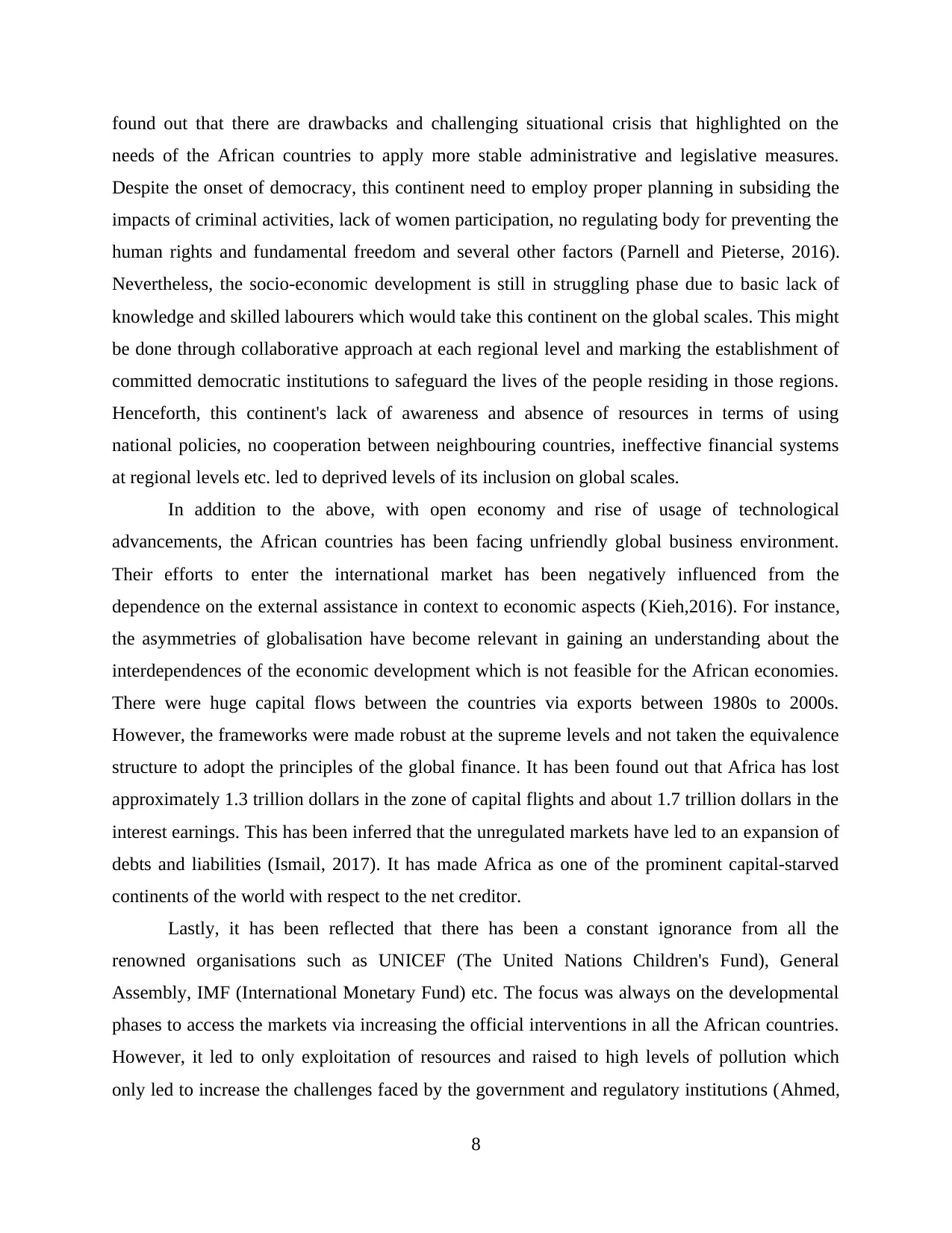
found out that there are drawbacks and challenging situational crisis that highlighted on the
needs of the African countries to apply more stable administrative and legislative measures.
Despite the onset of democracy, this continent need to employ proper planning in subsiding the
impacts of criminal activities, lack of women participation, no regulating body for preventing the
human rights and fundamental freedom and several other factors (Parnell and Pieterse, 2016).
Nevertheless, the socio-economic development is still in struggling phase due to basic lack of
knowledge and skilled labourers which would take this continent on the global scales. This might
be done through collaborative approach at each regional level and marking the establishment of
committed democratic institutions to safeguard the lives of the people residing in those regions.
Henceforth, this continent's lack of awareness and absence of resources in terms of using
national policies, no cooperation between neighbouring countries, ineffective financial systems
at regional levels etc. led to deprived levels of its inclusion on global scales.
In addition to the above, with open economy and rise of usage of technological
advancements, the African countries has been facing unfriendly global business environment.
Their efforts to enter the international market has been negatively influenced from the
dependence on the external assistance in context to economic aspects (Kieh,2016). For instance,
the asymmetries of globalisation have become relevant in gaining an understanding about the
interdependences of the economic development which is not feasible for the African economies.
There were huge capital flows between the countries via exports between 1980s to 2000s.
However, the frameworks were made robust at the supreme levels and not taken the equivalence
structure to adopt the principles of the global finance. It has been found out that Africa has lost
approximately 1.3 trillion dollars in the zone of capital flights and about 1.7 trillion dollars in the
interest earnings. This has been inferred that the unregulated markets have led to an expansion of
debts and liabilities (Ismail, 2017). It has made Africa as one of the prominent capital-starved
continents of the world with respect to the net creditor.
Lastly, it has been reflected that there has been a constant ignorance from all the
renowned organisations such as UNICEF (The United Nations Children's Fund), General
Assembly, IMF (International Monetary Fund) etc. The focus was always on the developmental
phases to access the markets via increasing the official interventions in all the African countries.
However, it led to only exploitation of resources and raised to high levels of pollution which
only led to increase the challenges faced by the government and regulatory institutions (Ahmed,
8
needs of the African countries to apply more stable administrative and legislative measures.
Despite the onset of democracy, this continent need to employ proper planning in subsiding the
impacts of criminal activities, lack of women participation, no regulating body for preventing the
human rights and fundamental freedom and several other factors (Parnell and Pieterse, 2016).
Nevertheless, the socio-economic development is still in struggling phase due to basic lack of
knowledge and skilled labourers which would take this continent on the global scales. This might
be done through collaborative approach at each regional level and marking the establishment of
committed democratic institutions to safeguard the lives of the people residing in those regions.
Henceforth, this continent's lack of awareness and absence of resources in terms of using
national policies, no cooperation between neighbouring countries, ineffective financial systems
at regional levels etc. led to deprived levels of its inclusion on global scales.
In addition to the above, with open economy and rise of usage of technological
advancements, the African countries has been facing unfriendly global business environment.
Their efforts to enter the international market has been negatively influenced from the
dependence on the external assistance in context to economic aspects (Kieh,2016). For instance,
the asymmetries of globalisation have become relevant in gaining an understanding about the
interdependences of the economic development which is not feasible for the African economies.
There were huge capital flows between the countries via exports between 1980s to 2000s.
However, the frameworks were made robust at the supreme levels and not taken the equivalence
structure to adopt the principles of the global finance. It has been found out that Africa has lost
approximately 1.3 trillion dollars in the zone of capital flights and about 1.7 trillion dollars in the
interest earnings. This has been inferred that the unregulated markets have led to an expansion of
debts and liabilities (Ismail, 2017). It has made Africa as one of the prominent capital-starved
continents of the world with respect to the net creditor.
Lastly, it has been reflected that there has been a constant ignorance from all the
renowned organisations such as UNICEF (The United Nations Children's Fund), General
Assembly, IMF (International Monetary Fund) etc. The focus was always on the developmental
phases to access the markets via increasing the official interventions in all the African countries.
However, it led to only exploitation of resources and raised to high levels of pollution which
only led to increase the challenges faced by the government and regulatory institutions (Ahmed,
8
Paraphrase This Document
Need a fresh take? Get an instant paraphrase of this document with our AI Paraphraser
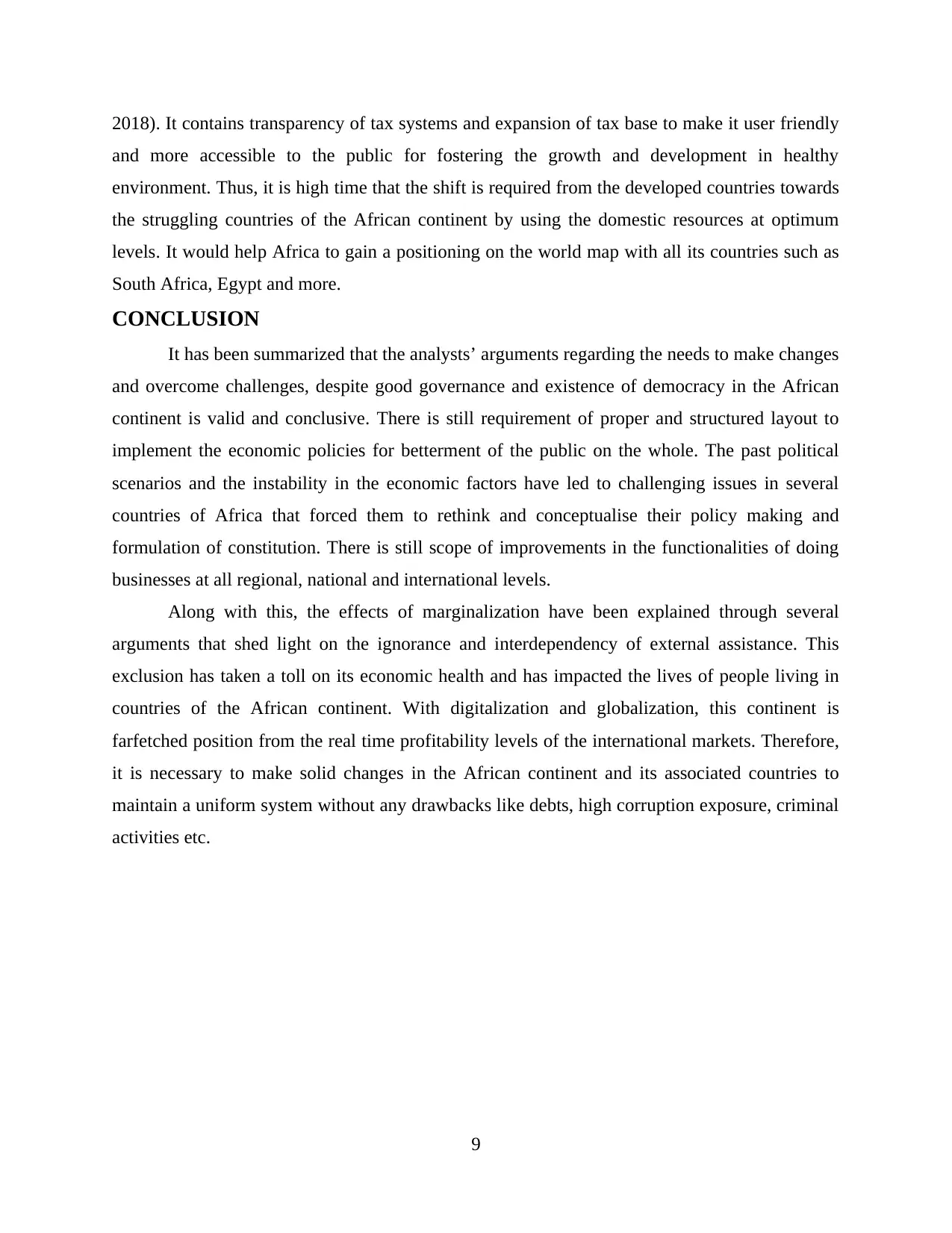
2018). It contains transparency of tax systems and expansion of tax base to make it user friendly
and more accessible to the public for fostering the growth and development in healthy
environment. Thus, it is high time that the shift is required from the developed countries towards
the struggling countries of the African continent by using the domestic resources at optimum
levels. It would help Africa to gain a positioning on the world map with all its countries such as
South Africa, Egypt and more.
CONCLUSION
It has been summarized that the analysts’ arguments regarding the needs to make changes
and overcome challenges, despite good governance and existence of democracy in the African
continent is valid and conclusive. There is still requirement of proper and structured layout to
implement the economic policies for betterment of the public on the whole. The past political
scenarios and the instability in the economic factors have led to challenging issues in several
countries of Africa that forced them to rethink and conceptualise their policy making and
formulation of constitution. There is still scope of improvements in the functionalities of doing
businesses at all regional, national and international levels.
Along with this, the effects of marginalization have been explained through several
arguments that shed light on the ignorance and interdependency of external assistance. This
exclusion has taken a toll on its economic health and has impacted the lives of people living in
countries of the African continent. With digitalization and globalization, this continent is
farfetched position from the real time profitability levels of the international markets. Therefore,
it is necessary to make solid changes in the African continent and its associated countries to
maintain a uniform system without any drawbacks like debts, high corruption exposure, criminal
activities etc.
9
and more accessible to the public for fostering the growth and development in healthy
environment. Thus, it is high time that the shift is required from the developed countries towards
the struggling countries of the African continent by using the domestic resources at optimum
levels. It would help Africa to gain a positioning on the world map with all its countries such as
South Africa, Egypt and more.
CONCLUSION
It has been summarized that the analysts’ arguments regarding the needs to make changes
and overcome challenges, despite good governance and existence of democracy in the African
continent is valid and conclusive. There is still requirement of proper and structured layout to
implement the economic policies for betterment of the public on the whole. The past political
scenarios and the instability in the economic factors have led to challenging issues in several
countries of Africa that forced them to rethink and conceptualise their policy making and
formulation of constitution. There is still scope of improvements in the functionalities of doing
businesses at all regional, national and international levels.
Along with this, the effects of marginalization have been explained through several
arguments that shed light on the ignorance and interdependency of external assistance. This
exclusion has taken a toll on its economic health and has impacted the lives of people living in
countries of the African continent. With digitalization and globalization, this continent is
farfetched position from the real time profitability levels of the international markets. Therefore,
it is necessary to make solid changes in the African continent and its associated countries to
maintain a uniform system without any drawbacks like debts, high corruption exposure, criminal
activities etc.
9
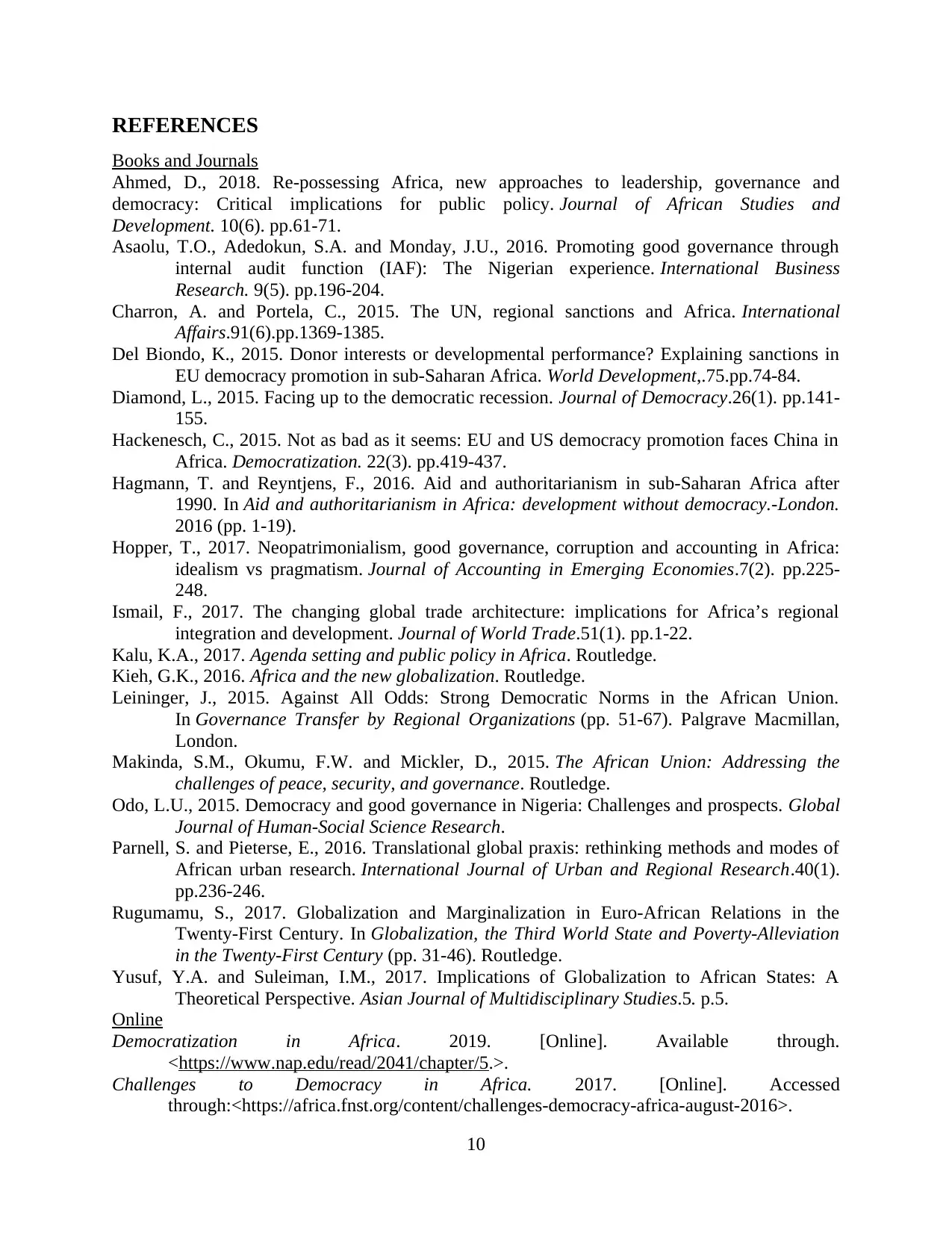
REFERENCES
Books and Journals
Ahmed, D., 2018. Re-possessing Africa, new approaches to leadership, governance and
democracy: Critical implications for public policy. Journal of African Studies and
Development. 10(6). pp.61-71.
Asaolu, T.O., Adedokun, S.A. and Monday, J.U., 2016. Promoting good governance through
internal audit function (IAF): The Nigerian experience. International Business
Research. 9(5). pp.196-204.
Charron, A. and Portela, C., 2015. The UN, regional sanctions and Africa. International
Affairs.91(6).pp.1369-1385.
Del Biondo, K., 2015. Donor interests or developmental performance? Explaining sanctions in
EU democracy promotion in sub-Saharan Africa. World Development,.75.pp.74-84.
Diamond, L., 2015. Facing up to the democratic recession. Journal of Democracy.26(1). pp.141-
155.
Hackenesch, C., 2015. Not as bad as it seems: EU and US democracy promotion faces China in
Africa. Democratization. 22(3). pp.419-437.
Hagmann, T. and Reyntjens, F., 2016. Aid and authoritarianism in sub-Saharan Africa after
1990. In Aid and authoritarianism in Africa: development without democracy.-London.
2016 (pp. 1-19).
Hopper, T., 2017. Neopatrimonialism, good governance, corruption and accounting in Africa:
idealism vs pragmatism. Journal of Accounting in Emerging Economies.7(2). pp.225-
248.
Ismail, F., 2017. The changing global trade architecture: implications for Africa’s regional
integration and development. Journal of World Trade.51(1). pp.1-22.
Kalu, K.A., 2017. Agenda setting and public policy in Africa. Routledge.
Kieh, G.K., 2016. Africa and the new globalization. Routledge.
Leininger, J., 2015. Against All Odds: Strong Democratic Norms in the African Union.
In Governance Transfer by Regional Organizations (pp. 51-67). Palgrave Macmillan,
London.
Makinda, S.M., Okumu, F.W. and Mickler, D., 2015. The African Union: Addressing the
challenges of peace, security, and governance. Routledge.
Odo, L.U., 2015. Democracy and good governance in Nigeria: Challenges and prospects. Global
Journal of Human-Social Science Research.
Parnell, S. and Pieterse, E., 2016. Translational global praxis: rethinking methods and modes of
African urban research. International Journal of Urban and Regional Research.40(1).
pp.236-246.
Rugumamu, S., 2017. Globalization and Marginalization in Euro-African Relations in the
Twenty-First Century. In Globalization, the Third World State and Poverty-Alleviation
in the Twenty-First Century (pp. 31-46). Routledge.
Yusuf, Y.A. and Suleiman, I.M., 2017. Implications of Globalization to African States: A
Theoretical Perspective. Asian Journal of Multidisciplinary Studies.5. p.5.
Online
Democratization in Africa. 2019. [Online]. Available through.
<https://www.nap.edu/read/2041/chapter/5.>.
Challenges to Democracy in Africa. 2017. [Online]. Accessed
through:<https://africa.fnst.org/content/challenges-democracy-africa-august-2016>.
10
Books and Journals
Ahmed, D., 2018. Re-possessing Africa, new approaches to leadership, governance and
democracy: Critical implications for public policy. Journal of African Studies and
Development. 10(6). pp.61-71.
Asaolu, T.O., Adedokun, S.A. and Monday, J.U., 2016. Promoting good governance through
internal audit function (IAF): The Nigerian experience. International Business
Research. 9(5). pp.196-204.
Charron, A. and Portela, C., 2015. The UN, regional sanctions and Africa. International
Affairs.91(6).pp.1369-1385.
Del Biondo, K., 2015. Donor interests or developmental performance? Explaining sanctions in
EU democracy promotion in sub-Saharan Africa. World Development,.75.pp.74-84.
Diamond, L., 2015. Facing up to the democratic recession. Journal of Democracy.26(1). pp.141-
155.
Hackenesch, C., 2015. Not as bad as it seems: EU and US democracy promotion faces China in
Africa. Democratization. 22(3). pp.419-437.
Hagmann, T. and Reyntjens, F., 2016. Aid and authoritarianism in sub-Saharan Africa after
1990. In Aid and authoritarianism in Africa: development without democracy.-London.
2016 (pp. 1-19).
Hopper, T., 2017. Neopatrimonialism, good governance, corruption and accounting in Africa:
idealism vs pragmatism. Journal of Accounting in Emerging Economies.7(2). pp.225-
248.
Ismail, F., 2017. The changing global trade architecture: implications for Africa’s regional
integration and development. Journal of World Trade.51(1). pp.1-22.
Kalu, K.A., 2017. Agenda setting and public policy in Africa. Routledge.
Kieh, G.K., 2016. Africa and the new globalization. Routledge.
Leininger, J., 2015. Against All Odds: Strong Democratic Norms in the African Union.
In Governance Transfer by Regional Organizations (pp. 51-67). Palgrave Macmillan,
London.
Makinda, S.M., Okumu, F.W. and Mickler, D., 2015. The African Union: Addressing the
challenges of peace, security, and governance. Routledge.
Odo, L.U., 2015. Democracy and good governance in Nigeria: Challenges and prospects. Global
Journal of Human-Social Science Research.
Parnell, S. and Pieterse, E., 2016. Translational global praxis: rethinking methods and modes of
African urban research. International Journal of Urban and Regional Research.40(1).
pp.236-246.
Rugumamu, S., 2017. Globalization and Marginalization in Euro-African Relations in the
Twenty-First Century. In Globalization, the Third World State and Poverty-Alleviation
in the Twenty-First Century (pp. 31-46). Routledge.
Yusuf, Y.A. and Suleiman, I.M., 2017. Implications of Globalization to African States: A
Theoretical Perspective. Asian Journal of Multidisciplinary Studies.5. p.5.
Online
Democratization in Africa. 2019. [Online]. Available through.
<https://www.nap.edu/read/2041/chapter/5.>.
Challenges to Democracy in Africa. 2017. [Online]. Accessed
through:<https://africa.fnst.org/content/challenges-democracy-africa-august-2016>.
10
⊘ This is a preview!⊘
Do you want full access?
Subscribe today to unlock all pages.

Trusted by 1+ million students worldwide
1 out of 13
Your All-in-One AI-Powered Toolkit for Academic Success.
+13062052269
info@desklib.com
Available 24*7 on WhatsApp / Email
![[object Object]](/_next/static/media/star-bottom.7253800d.svg)
Unlock your academic potential
Copyright © 2020–2026 A2Z Services. All Rights Reserved. Developed and managed by ZUCOL.
